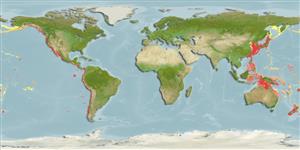Preferred temperature (Ref.
115969): 9.3 - 27.7, mean 20.7 (based on 1526 cells).
Phylogenetic diversity index (Ref.
82804): PD
50 = 0.5625 [Uniqueness, from 0.5 = low to 2.0 = high].
Bayesian length-weight: a=0.00741 (0.00662 - 0.00830), b=3.05 (3.02 - 3.08), in cm Total Length, based on LWR estimates for this species (Ref.
93245).
Trophic level (Ref.
69278): 3.4 ±0.1 se; based on diet studies.
लौटाव (Ref.
120179): माध्यम, न्यूनतम जनसंख्या दुगनी होने का समय 1.4 - 4.4 वर्ष। (K=0.12-0.22; tm=2-3; tmax=18).
Prior r = 0.48, 95% CL = 0.32 - 0.73, Based on 3 stock assessments.
Fishing Vulnerability (Ref.
59153): Low to moderate vulnerability (31 of 100).
Climate Vulnerability (Ref.
125649): Low vulnerability (24 of 100).
